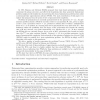Free Online Productivity Tools
i2Speak
i2Symbol
i2OCR
iTex2Img
iWeb2Print
iWeb2Shot
i2Type
iPdf2Split
iPdf2Merge
i2Bopomofo
i2Arabic
i2Style
i2Image
i2PDF
iLatex2Rtf
Sci2ools
125
Voted
MST
2007
2007
The Complexity of Polynomial-Time Approximation
In 1996, Khanna and Motwani [KM96] proposed three logic-based optimization problems constrained by planar structure, and offered the hypothesis that these putatively fundamental problems might provide insight into characterizing the class of optimization problems that admit a polynomial-time approximation scheme (PTAS). The main contribution of this paper is to explore this program from the point of view of parameterized complexity. Problems of optimization are naturally parameterized by the parameter k = 1/ . An optimization problem admits a PTAS if and only if there is an algorithm Φ, that, given an input of size n, and a parameter value k = 1/ , produces a solution that is within a multiplicative factor of (1 + ) of optimal, in a running time that is polynomial for every fixed value of . This definition admits the possibility that the degree of the polynomial that bounds the running time of Φ may increase, even quite dramatically, as a function of k = 1/ . In fact, amongst the...
Related Content
| Added | 27 Dec 2010 |
| Updated | 27 Dec 2010 |
| Type | Journal |
| Year | 2007 |
| Where | MST |
| Authors | Liming Cai, Michael R. Fellows, David W. Juedes, Frances A. Rosamond |
Comments (0)

